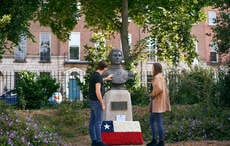Actor and director Rupert Everett says he wants to rescue Irish dramatist Oscar Wilde from his image as a sainted, long-suffering martyr
Wilde was a man in full, the film actor (who has Irish grandparents) insists, and in his new film, "The Happy Prince," he wants to show the world exactly how.
At the height of his career as the most successful playwright in London, there was an unmistakable whiff of scandal around Oscar Wilde. From his bright green carnations to his often hilarious put-downs, he stood in very stark contrast to his remarkably buttoned-up age.
Read more: Rupert Everett calls Oscar Wilde “Christ-like” and “the beginning of the gay movement”

Colin Morgan and Rupert Everett in The Happy Prince
No wonder he's such an irresistible role for actor and director Rupert Everett, 59, who has known more than his fair share of public and private controversies himself (among them falling out with Madonna after the publication of his memoirs and working for a time as a rent boy in his younger years to fund his acting classes).
If Everett sees a kindred spirit in Wilde, you can certainly forgive him. Like Wilde he's been the ultimate insider and the most resolute outsider, he's known both privilege and privation, he's been a film star and a near nobody. It was probably inevitable in that case that he would take a run at Wilde, given the similarities.
We are still learning exactly how to tell Oscar Wilde's story, of course. Even in 2018 no film, play or book has yet managed to reconcile all of Wilde's disparate characteristics: Irishman, playwright, poet, provocateur, fiery nationalist, champagne socialist, married gay father, and above all lover and philosopher, he's uncommonly hard to pin down.
The trouble with Oscar is that people always pick the parts that they like and leave the rest, as generations of his biographers in print, stage and screen have all clearly done.
Some things about him they can't leave out though: he was the wittiest dramatist in hundreds of years, he was the gifted Irishman who was the toast of Victorian London, he was the champion of gay rights before the idea even existed, and he was the principled Irish nationalist that went head to head with the father of Ulster unionism Edward Carson.

There's really no end to the approaches you can take to Wilde and in "The Happy Prince," Everett's new biopic about the Irish writer (best known for his turn with Julia Roberts in "My Best Friends Wedding") he tries most of them.
“He's very respected and revered by people. And I think everyone heterosexual who has written about him has understandably been very careful and reverential and ended up treating him like a saint.”
And the result of that effort has been that he's developed a kind of family values kind of character, who's very troubled and grave, Everett says. “But if you read Max Beerbohm for example writing about Wilde in his glory days, you understand that he was quite a monster too.”
“I felt I really had an angle on him that was not my fantasy, but that was corroborated by all the references to everything that you could read about him. Certainly, in exile in Europe, he was one of the great vagabonds of the 19th century you know, a jailbird who scoured the boulevards for rich people to fleece. That elegance he once had, had kind of fallen by the wayside and what remained was just the need to have a good drink and a bit of fun. And he knew better than anyone how to do that.”

Rupert Everett as Oscar Wilde in The Happy Prince
In "The Happy Prince" Wilde isn't the haunted martyr inconveniently living on after the world has moved on.
“As he says himself in the film, there's nothing like an Irish tinker. He was still remarkable company when he got into his stride. What's amazing about him in exile is the fact that he wasn't really a victim at all. He was completely uncompromised in one sense by the hand fate dealt him.”
In Europe, Wilde replaced his audience of royalty and the stars for rent boys and petty criminals, Everett says. “He reorganized another kind of salon for himself. In some respects, he had quite an exciting time. I mean without the years in exile I don't think he would have existed in the same way. You can't be a Christ figure doing the stations of the Cross in a place like Paris. In the last part of his life, he was transformed by what he could say and you there.”
In the film, Everett rescues Wilde from any by the numbers storyline, perhaps especially from the ones that want to turn him into a plaster saint. “I'm thrilled to hear you say that because that's exactly what I was trying to achieve. I want to rebrand him as something much more human and much more approachable really.”
As Wilde's long-suffering wife Constance, actress Emily Watson does terrific work. “Her trouble is that she always listens to the lawyers, which is what made her write such hard letters to her husband. And one of the things Wilde never could do was reconcile himself to was the fact that he treated her so badly.”

Edwin Thomas, Colin Firth and Rupert Everett in The Happy Prince
The only other real surprise to Everett in the whole research process was learning that there had been another man who went into the dock with Wilde, who could have turned Queen's evidence and been let off, but decided not to.
“So he stood by Wilde and also got two years with hard labor for being gay. But there's never a mention from any of them afterward saying how is he? Is he OK? What happened to him? Nothing.”
Wilde never mentions the man's quiet heroism anywhere and nothing is heard from him again until 1929 when Lord Alfred Douglas is staying in a hotel and orders something and the man who brings up the room service is the man who went to prison with Wilde.
“And that's the only time he's ever mentioned again. And after that, he disappears from history. Really, what he did was so valiant that you'd think there would be some small man mention of him somewhere. Nothing. And it's the same Wilde.”
Now that we have mentioned Lord Alfred Douglas, what does he make of him? “He's just a young person. If you put yourself in the hands of a young person and you are that kind of complicated genius, that's your fault really. That's what's going to happen. And so it wasn't in one sense Bosie's fault. I mean the thing about the Oscar is that everything is his fault. He is, as he says, his own Judas. Which is what's so delightful about him and so awful, because most of us don't get caught out.”
As Robbie Ross, Wilde's oldest and most faithful friend, actor Edwin Thomas is superb. “I think he's the real love story,” Everett confesses. “You know it's his ashes that lie alongside Oscar's in Paris. It's he who defended Oscar and rehabilitated his entire career and got all the rights and the copyrights back and it's him the world wanted to be with.”
Does Everett agree that part of the prosecution of Wilde was motivated by revenge? By the outraged sensibilities of the Victorian establishment when confronted with a subversive Irish artist?
“Yes absolutely. I think the rest of the world think that Oscar was an English person and of course the whole point about him is that he's not, he's an outsider. He mocks the class system from the outside. And he's so conflicted. What he does is change everything about himself to suit them. So his murder at their hands is doubly excruciating. Because he did everything he could to become them.”

Oscar Wilde.
Everett also believes Wilde's trail is the beginning of the gay liberation movement. “The road to gay liberation starts with him. He's the punctuation point that kind of launched the debate in the 20th century. Homosexuality wasn't really a word before him. So he very much is a part of our LGBTQ history.”
Are you surprised to see how much Irish society has changed? “I think it's one of the great countries in the world. Luckily I have Irish grandparents so I might become Irish. For me, in Brexit Britain, we're going to be back to the land of Camp Coffee and electric radios and the world of the 1950's England. It's a huge mistake.
Even if we manage to make a great success of it, to me it's a huge mistake. Especially ironic is the fact that I finally managed to make this European film, because in terms of just languages and financing, its cast comes from all over Europe. And the fact that we may soon be no longer European is is still very depressing.”
"The Happy Prince" is now playing.




Comments